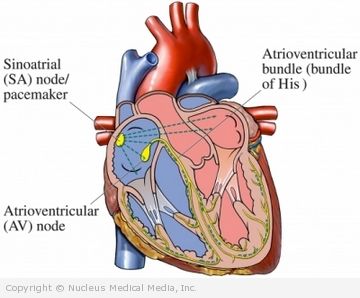Wolff-Parkinson-White syndrome
Wolff-Parkinson-White syndrome – Definition
Wolff-Parkinson-White syndrome (WPW) is a disorder of the heart’s electrical activity. It causes the heart to beat with an irregular rhythm and faster than normal. This is called tachyarrhythmia.
Wolff-Parkinson-White syndrome – Causes
In a normal heart, electrical signals that cause the heart to beat begin in the area known as the SA node, located in the right upper chamber (atrium) of the heart. The electrical signal goes from the SA node down to the AV (atrioventricular) node which is between the atria and the lower chambers of the heart (the ventricles). The AV node slows down the electrical impulse so that the ventricles have time to fill with blood before contracting.
In WPW, the electrical signals travel along an extra, abnormal pathway that go around the AV node. This causes the signals to be unregulated and to arrive at the ventricles too soon. The signals often alert the ventricles to contract abnormally. As a result, the heart beats much faster than normal.
The extra pathway is caused by abnormal growth of tissue that connects the heart’s chambers. This occurs in the embryo—during the first eight weeks after conception.
Wolff-Parkinson-White syndrome – Risk Factors
A risk factor is something that increases your chance of developing a disease or condition. There are no known risk factors for WPW syndrome.
Wolff-Parkinson-White syndrome – Symptoms
Some people with WPW syndrome never have tachyarrhythmia and its associated symptoms. In those who do, symptoms usually begin between ages 11-50. The frequency and severity of the tachyarrhythmia varies from one person to another and may be associated with any or all of these symptoms:
- Palpitations (sensation of a pounding heartbeat)
- Chest pain or tightness
- Dizziness
- Fainting
- Shortness of breath
In rare cases, a person will go into cardiac arrest (the heart stops pumping) and lose consciousness.
Wolff-Parkinson-White syndrome – Diagnosis
The doctor will ask about your symptoms and medical history, and perform a physical exam. If you are having a tachyarrhythmia due to WPW syndrome, you will have normal or low blood pressure and a heart rate of 150-250 beats per minute. (A normal heart rate is 60-100 beats per minute.)
If you are not having irregular heart rhythms during the exam, the results of the exam may be normal. In either case, an electrocardiogram (a test that records the heart’s activity by measuring electrical currents through the skin) will usually show a “delta wave” that signals an extra electrical pathway.
Other tests may include:
- Monitoring with a Holter monitor for 24-48 hours to check for any episodes of irregular heart beat.
- Electrophysiology study, in which a catheter (a thin tube designed to be inserted into a blood vessel) is passed to the interior of the heart where it takes detailed measurements of its electrical activity. This will detect the extra pathway.
Wolff-Parkinson-White syndrome – Treatment
The goal of treatment is to reduce or eliminate episodes of tachyarrhythmia and associated symptoms. If you do not have symptoms, treatment is usually not necessary.
If you do need treatment, it may include:
Medication
Antiarrhythmics may be given to coordinate your heart’s electrical signals. This can control or prevent episodes of rapid heartbeat. However, you must take the medicine carefully because it can sometimes make an abnormal heart rhythm worse.
Radiofrequency Ablation
This is a procedure in which a catheter delivers energy at a particular radiofrequency to your heart. This destroys (ablates) the abnormal electrical pathway. In most cases, ablation is successful and ends the need to take medicine.
Open-heart Surgery
Open-heart surgery is done to destroy the abnormal pathway. However, this procedure is rarely done.
Defibrillation
This is done in the case of cardiac arrest, which is rare. Defibrillation gives the heart a brief electric shock. This procedure converts a rapid, irregular heartbeat back into a normal heartbeat.
If you are diagnosed with WPW syndrome, follow your doctor’s instructions.
Wolff-Parkinson-White syndrome – Prevention
There is no known way of preventing WPW syndrome. However, symptoms can be prevented with proper treatment.

